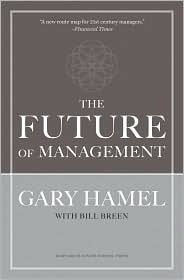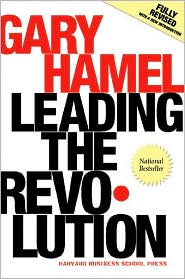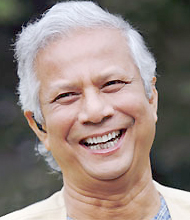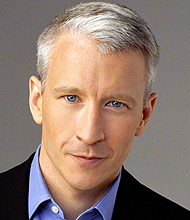| TRAVELS FROM |
|
SPEAKING FEE RANGE ** Please note that while this speaker’s specific speaking fee falls within the range posted above (for Continental U.S. based events), fees are subject to change. For current fee information or international event fees (which are generally 50-75% more than U.S based event fees), please contact us. $75,000 and above |
|
BOOK GARY HAMEL speakers@coreagency.com |
| TRAVELS FROM |
|
SPEAKING FEE RANGE* $75,000 and above |
|
Book Gary Hamel speakers@coreagency.com |
- With a reputation as the world's leading expert on business strategy and one of the top global business thinkers, Hamel has worked with hundreds of companies to help them change their management approach and increase innovation.
- Hamel takes a practical approach to re-imagining management in today’s technology-driven marketplace by providing a blueprint that helps organizations prepare for the future.
- Hamel equips his audiences with practical steps they can take to change their management paradigm from one that’s stagnant and out of date to one that’s dynamic and successful.
- He is the most reprinted author in the Harvard Business Review and has written four books about reinventing management.
Forbes has called Gary Hamel "the world's leading expert on business strategy,” and the Financial Times says he is a “management innovator without peer.” He also has been named one of the Thinkers50 2015, a list of the most influential management thinkers in the world. His groundbreaking concepts such as “strategic intent,” “core competence,” “industry revolution” and “management innovation” have changed management in organizations across the world.
A graduate of Andrews University and the University of Michigan, Hamel has taught at the London Business School for more than 30 years. He served as the Visiting Professor of International Business at the University of Michigan and is director of the Management Innovation eXchange, an online community redefining management through open innovation. Hamel has been ranked by The Wall Street Journal as the world’s most influential business thinker and is a fellow of the Strategic Management Society and the World Economic Forum.
He is the most reprinted author in the Harvard Business Review’s history. His four books—What Matters Now, The Future of Management, Leading the Revolution and Competing for the Future— have been translated into more than 25 languages. In his most recent books (What Matters and The Future), Hamel builds the case for reinventing management and gives a practical blueprint for creating organizations prepared to face the future.
In addition to his consulting, Hamel has worked with organizations to:
· Build one of the world’s first “idea markets” inside a global energy leader.
· Use crowdsourcing to help a European high-tech company build a game-changing strategy.
· Orchestrate a comprehensive effort to turn a durable goods manufacturer into one of the world’s most innovative companies.
· Help a Korean company re-engineer its management practices around the principles of openness, community and meritocracy.
· Design and deploy an online platform that allowed employees of a top fashion house to share and develop ideas for strengthening their company’s core values.
· Run an online “hackathon” in which more than 1,700 senior executives collaborated to reinvent the HR function.
Hamel has consulted with hundreds of companies to help them be more innovative and profitable, and regularly delivers keynotes on the topics of strategy, leadership, innovation and change.
Gary Hamel takes a pragmatic approach to his presentations, focused on helping attendees see how current management paradigms won’t make it in the new economy. Hamel turns long-time management processes on their head by showing audiences why a bottom-up design is more successful than one that’s top-down.
Making Innovation a Core Competence.
Innovation is the only insurance against irrelevance, the only antidote to margin-crushing competition and the only guarantee of enduring customer loyalty. Despite this, there’s not one company in a hundred that has made innovation the work of everyone, every day. Innovation is still “bolted on” rather than “baked in.” As a result, vast quantities of human imagination are squandered every day. It doesn’t have to be this way. In my research and consulting, I’ve demonstrated that it’s possible to make innovation both instinctive and intrinsic. Doing so requires a systematic effort to embed pro-innovation values in every management process and practice. Over the past decade, organizations around the world re-engineered their operating models for the sake of efficiency. Problem is, efficiency is now a commodity. Looking forward, the winners will be the companies that retooled their management model for the sake of innovation.
Building an “Evolutionary Advantage.”
In our highly dynamic world, it’s not enough for an organization to possess a competitive advantage at a point in time; it needs an evolutionary advantage over time—a capacity to change as fast as change itself; to change before a crisis breaks. All too often, deep change is belated and convulsive, rather than proactive and energizing. That’s why most change programs are more about catching-up than leading. A truly adaptable company never takes refuge in denial, always plays offense and captures more than its share of tomorrow’s opportunities. It is relentlessly optimistic, entrepreneurial, and future-focused. It encourages contrarian thinking and rapid experimentation. It has fluid boundaries and small, nimble teams. It celebrates initiative, speed and daring. If this doesn’t describe your organization, there’s work to be done. Yes, it takes ingenuity and perseverance to future-proof an organization, but it can be done.
Creating Organizations that are Fit for the Future and Fit for Human Beings.
A recent Gallup survey found that only 13% of employees around the world are emotionally engaged in their work. This suggests that most organizations squander more human capability than they actually use. In the creative economy this is competitively untenable. The solution: a complete rethink of our legacy management practices. Instead of asking, “How do we get employees to better serve the organization’s goals?,” leaders need to ask, “How do we create a work environment that inspires every one to give the very best of themselves?” The human capabilities that matter most—initiative, imagination and passion—are gifts; they cannot be commanded. That’s why the control-oriented, hierarchical management practices that predominate in most organizations must give way to a new management model that emphasizes freedom, community and purpose. For human beings to thrive at work, bureaucracy must die. Though many may doubt it, I’ve demonstrated in my research and consulting that it’s possible to create a bureaucracy-free organization without sacrificing discipline, focus and accountability.
Inventing “Management 2.0.”
Management—the tools and methods we use to mobilize and organize resources to productive ends—is one of humankind’s most important social technologies. It is nothing less than “the technology of human accomplishment.” Problem is, there’s been very little fundamental management innovation in more than a hundred years. Most organizations hew closely to a management model that would have been familiar to Henry Ford—one in which strategy gets set at the top, big leaders appoint little leaders, power is a function of position, tasks are assigned, and human beings are viewed as “resources.” This model, which served us well for more than a century, is now a competitive liability. Management 1.0 was built around the principles of standardization, specialization, conformance, predictability, and the use of intrinsic rewards. Tomorrow’s most successful organizations will be built atop web-centric principles such as transparency, disaggregation, meritocracy, activism and experimentation. To make the jump to “Management 2.0,” organizations will need to “hack” their tradition-encrusted management practices. This requires an open, collaborative process where everyone has the chance to help shape the processes that drive organizational success. In the years to come, the most successful organizations will be those that move faster than their competitors to embrace the new principles and practices of Management 2.0.
Becoming a Champion of Change.
As Ralph Waldo Emerson once said, “there are always two parties—the party of the fast and the party of the future.” Through my teaching and coaching, I help leaders at all levels become champions of change. I show them how to systematically challenge their deeply-embedded beliefs, how to encourage dissent, learn from the vanguard, and upscale their own aspirations. I believe the capacity for leadership exists within every human being, and that traditional, top-down leadership models are unsustainable in a world of relentless change and eroding trust. Leadership isn’t about “where you sit,” but “who you are.” influence doesn’t come from a title, but from competence, empathy and authenticity. Over the past few decades, human beings have become ever more authority-phobic, and ever less inclined to view positional power as legitimate. At the same time, the problems facing our planet have multiplied in scope and complexity. The result is a leadership gap in institutions both public and private. To close this gap, we will need to dramatically rethink the goals and mechanics of leadership development. We must accept that in our hyper-social world, authority trickles up, not down, and permission to lead comes from below, not above. Just as we need post-bureaucratic organizations, we need post-bureaucratic leaders. We need to be passionate about helping individuals to grow their “leadership capital” wherever they may sit in the organization.
 The Future of Management
The Future of Management
What fuels long-term business success? Not operational excellence, technology breakthroughs, or new business models, but management innovation-new ways of mobilizing talent, allocating resources, and formulating strategies. Through history, management innovation has enabled companies to cross new performance thresholds and build enduring advantages.
In The Future of Management, Gary Hamel argues that organizations need management innovation now more than ever. Why? The management paradigm of the last century-centered on control and efficiency-no longer suffices in a world where adaptability and creativity drive business success. To thrive in the future, companies must reinvent management.
Hamel explains how to turn your company into a serial management innovator, revealing:
Practical and profound, The Future of Management features examples from Google, W.L. Gore, Whole Foods, IBM, Samsung, Best Buy, and other blue-ribbon management innovators.
Order Here
 Leading the Revolution
Leading the Revolution
Gary Hamel, world-renowned business thinker and coauthor of Competing for the Future, the book that set the management agenda for the 1990s, now delivers an agenda for the twenty-first century with the national bestseller, Leading the Revolution. Fully revised with a new introduction, this book provides an action plan for any company or individual intent on becoming and staying an industry revolutionary.
Hamel argues that the fundamental challenge companies face is reinventing themselves and their industries, not just in times of crisis -- but continually. Based on an extensive study of "gray-haired revolutionaries," including Charles Schwab, Cisco, Virgin, UPS, Semex, and GE Capital, Leading the Revolution shows how companies can continue to grow and thrive, even in ever-changing turbulent world markets.
Leading the Revolution is not a book for cozy corner-office types. It is for everyone who has the guts to act on the knowledge that our heritage is no longer our destiny. This groundbreaking book from the premier business thinker of our time is a call to arms for the dreamers and doers who will lead us into the age of revolution.
Order Here

 VIDEO
VIDEO PROGRAMS
PROGRAMS BOOKS
BOOKS










































